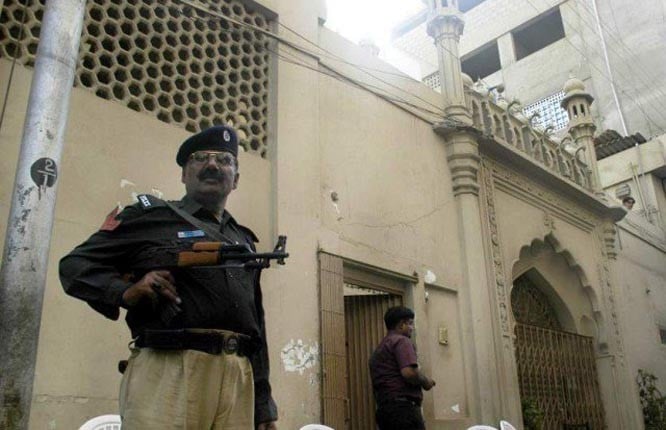
The appointment and subsequent ouster of Atif Mian from the economic advisory council exposes the government’s vulnerability to the pressure exerted by religious groups

Fearing a nationwide campaign against his nomination, the government announced the exclusion of Prof Atif Mian from the Economic Advisory Council on September 7 -- ironically the date when Pakistan’s parliament had passed the second amendment in the constitution that declared Ahmadis non-Muslims 44 years ago.
"The government has decided to take back the nomination of Atif Mian from the EAC. Government wants to take along all ulema and social strata along with her. And if one nomination creates a different impression it is not good to continue it," reads tweet (in translation) of Federal Information Minister, Ch Fawad Hussain on September 6.
Atif Mian’s name surfaced in October 2014 for the first time when during a sit-in protest against the then government chairman Pakistan Tehreek-i-Insaf (PTI) Imran Khan introduced Atif Mian as one of the world’s top economists. "Prof Atif Mian is listed in the top 25 economists of the world," Imran had said, adding that he would make such a man the finance minister, not some close relative of his.
However, after the news appeared that Atif Mian was an Ahmadi, Khan while talking to clerics, clarified within a week that he was not aware of Mian’s religious beliefs. "Our constitution has declared them non-Muslim for not believing in the finality of Prophet Muhammad (PBUH). And I will not comprise on this," he told a cleric in a video clip.
However, when Khan formed the government in late August, he included Mian in the EAC. Political observers had anticipated that sooner rather than later, Mian would be thrown out of the council.
Even PTI insiders see Information Minister Fawad Chaudhry’s diatribes against religious extremists for opposing the appointment of Atif Mian as an aberration. The dominant thinking within the ruling party supported the idea of the forced resignation of the economist, "Khan was listening to his religious affairs minister on this issue instead of listening to Fawad Chaudhry," says a party insider.
Party insiders say that at the 11th hour minister for religious affairs, Noor-ul-Haq Qadri advised the prime minister that the issue of Atif Mian’s appointment could pit religious groups, including Tehreek-e-Labbaik Pakistan, against the PTI government and it could lead to a confrontation between religious group and the PTI government.
Bowing to such demands of religious extremist groups is not in the interest of Pakistan. Very recently, when the country’s military and foreign policy establishments were busy finalising strategy for talks with the US Secretary of State, Mike Pompeo, TLP activists had started their march towards Islamabad, demanding of the PTI government to either sever diplomatic relations with Holland, or the blasphemous cartoon competition should be immediately called off. Pakistan’s Foreign Office immediately sprang into action. Foreign Minister Shah Mehmood Qureshi talked to his Dutch counterpart on the telephone and the foreign office issued a hard-hitting statement condemning the act.
This was a clear indication that the newly elected political government not only took the agenda of TLP very seriously but they had also adopted their agenda to be the basis of the state’s ideology and identity.
Political observers see a clear tilt of political and state structures of the country towards the religious right, "A clear tilt towards the extreme right has become visible in Pakistan’s state structure. TLP’s march and government’s response to it are two visible signs of this tilt," says Saeed Shafqat, a political analyst.
"The army itself is a big rightist force in the country. These signs started to become more visible as the time for the arrival of the US Secretary of State came nearer," Shafqat adds.
Not very long ago Imran Khan had acted as a cheer leader for the TLP campaign against the Sharif government over the issue of the change in the oath related to the issue of finality of the Prophet (PBUH). Imran reportedly told a news conference in November 2017 that his party activists sought permission from him to join the TLP protest against the Sharif government. During the election campaign, Khan frequently raised the issue, saying Pakistan Muslim League-Nawaz (PML-N) had committed "blasphemy" by changing the oath.
So while taking the decision on revoking the appointment of Atif Mian, Imran Khan had the option of either forgoing goodwill for PTI that existed in the TLP ranks or to further strengthen his credentials as a supporter of the religious right. His credentials as a champion of religious causes had already been reinforced with the foreign office taking up the issue of the cartoon competition.
The already existing tilt towards the religious right in the government as well as in the army made the appointment of Atif Mian an aberration and revoking of the appointment a norm. What happened behind closed doors between the government and other power centres will never come to the surface.
Read also: Editorial
However, official sources say that the religious lobby is not the only factor that forced Imran Khan into revoking the appointment of Atif Mian. For its part, the TLP is happy over its victory, "It is because of our statements and protests that the government was forced to revoke the appointment," says Pir Ejaz, TLP spokesperson. They expect that this was not their last victory.
The issue has already added to the hate campaign against Ahmadis in Pakistan. A newspaper is under fire for printing an advertisement of Jamaat-e-Ahmadiyya Pakistan, paying tributes to the Pakistan army’s martyrs of September 1965 Pak-India war belonging to the Ahmadi community. The newspaper had to give a clarification, saying it was a ‘mistake’. Religious extremists want a case filed against the paper. Similarly, applications have been submitted against Ahmadis in different police stations under anti-Ahmadi laws of the country.